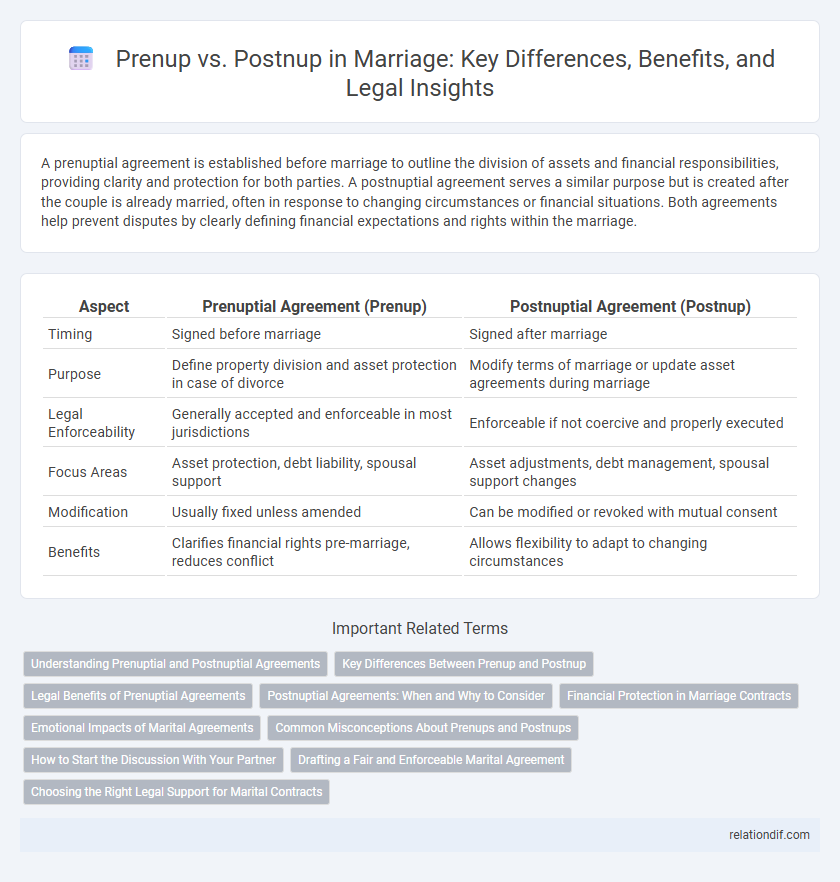A prenuptial agreement is established before marriage to outline the division of assets and financial responsibilities, providing clarity and protection for both parties. A postnuptial agreement serves a similar purpose but is created after the couple is already married, often in response to changing circumstances or financial situations. Both agreements help prevent disputes by clearly defining financial expectations and rights within the marriage.
Table of Comparison
| Aspect | Prenuptial Agreement (Prenup) | Postnuptial Agreement (Postnup) |
|---|---|---|
| Timing | Signed before marriage | Signed after marriage |
| Purpose | Define property division and asset protection in case of divorce | Modify terms of marriage or update asset agreements during marriage |
| Legal Enforceability | Generally accepted and enforceable in most jurisdictions | Enforceable if not coercive and properly executed |
| Focus Areas | Asset protection, debt liability, spousal support | Asset adjustments, debt management, spousal support changes |
| Modification | Usually fixed unless amended | Can be modified or revoked with mutual consent |
| Benefits | Clarifies financial rights pre-marriage, reduces conflict | Allows flexibility to adapt to changing circumstances |
Understanding Prenuptial and Postnuptial Agreements
Prenuptial and postnuptial agreements are legal contracts between spouses that outline asset division and financial responsibilities in the event of divorce or separation. A prenuptial agreement is signed before marriage, providing clarity on property rights and debt allocation, while a postnuptial agreement is executed after marriage, often addressing changes in financial circumstances or marital issues. Both agreements serve to protect individual assets and minimize disputes, offering a clear framework for financial matters within a marriage.
Key Differences Between Prenup and Postnup
Prenuptial agreements are executed before marriage to outline asset division and financial responsibilities in case of divorce, while postnuptial agreements are created after marriage to address similar matters or update existing terms. Prenups typically help couples clarify financial expectations in advance, whereas postnups offer flexibility to adjust agreements due to changes in circumstances such as wealth, children, or property. Both agreements require full financial disclosure and legal enforceability varies by jurisdiction, emphasizing the importance of legal counsel in drafting these contracts.
Legal Benefits of Prenuptial Agreements
Prenuptial agreements provide legal benefits by clearly defining asset division, debt responsibility, and spousal support in the event of divorce, thereby reducing potential conflicts and costly litigation. Courts generally uphold prenups when drafted properly, offering predictability and protection for both parties before marriage. These agreements can also safeguard family inheritances and business interests, ensuring financial security and clarity.
Postnuptial Agreements: When and Why to Consider
Postnuptial agreements provide couples with a legal framework to address financial and property matters after marriage, especially in cases of changing circumstances such as business ventures, inheritance, or financial imbalances. These contracts can protect individual assets, clarify debt responsibility, and reduce potential conflicts during divorce or separation. Considering a postnuptial agreement is particularly relevant when unexpected financial developments arise or if the couple did not create a prenuptial agreement before tying the knot.
Financial Protection in Marriage Contracts
Prenuptial and postnuptial agreements both serve as crucial legal instruments for financial protection in marriage contracts, delineating asset division, debt responsibility, and spousal support terms. Prenups are established before marriage to safeguard individual wealth and clarify financial rights, while postnups are created after marriage to address evolving financial circumstances and reinforce asset protection. Both agreements provide enforceable frameworks that help prevent disputes and ensure equitable financial arrangements during marriage or in the event of divorce.
Emotional Impacts of Marital Agreements
Prenuptial and postnuptial agreements often trigger complex emotional responses, including anxiety and distrust, as couples confront the possibility of marital dissolution. These legal contracts can also foster feelings of security and clarity by setting clear expectations and protecting individual assets. Navigating the emotional terrain requires open communication and mutual understanding to mitigate potential strain on the relationship.
Common Misconceptions About Prenups and Postnups
Common misconceptions about prenups and postnups often include the belief that they signify a lack of trust or doomed relationships, when in reality both agreements serve to protect assets and clarify financial expectations. Many assume prenups are only for the wealthy, but they are crucial for anyone with significant assets, debts, or children from previous relationships. Postnups, often considered less enforceable, actually hold similar legal weight in many jurisdictions and provide flexibility when circumstances change after marriage.
How to Start the Discussion With Your Partner
Begin the conversation by expressing the importance of financial transparency and mutual protection in marriage, emphasizing that prenups and postnups serve as tools to safeguard both partners' interests. Use clear, empathetic language to assure your partner that the discussion is about trust and planning rather than distrust or conflict. Setting a calm, private environment can help both parties feel comfortable sharing concerns and expectations openly.
Drafting a Fair and Enforceable Marital Agreement
Drafting a fair and enforceable marital agreement requires clear communication and full financial disclosure from both parties to ensure transparency and mutual understanding. Prenups establish terms before marriage, while postnups are created after the wedding, each needing precise language to define asset division, spousal support, and debt responsibilities. Consulting experienced family law attorneys helps tailor the agreement to state laws, increasing its likelihood of being upheld in court.
Choosing the Right Legal Support for Marital Contracts
Selecting the right legal support for prenuptial and postnuptial agreements is crucial to ensure enforceability and tailored protection of assets. Experienced family law attorneys specializing in marital contracts can provide clarity on state-specific laws, negotiate terms that reflect both parties' interests, and help prevent future disputes. Comprehensive legal guidance enhances the security and fairness of both prenups drafted before marriage and postnups created after marriage.
prenup vs postnup Infographic

 relationdif.com
relationdif.com